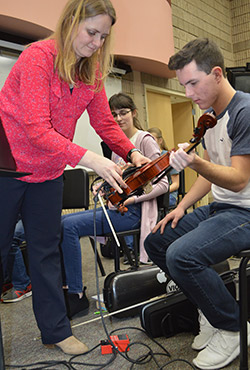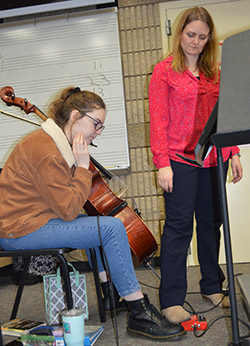
Senior Lucas Cossar got his violin plugged into an amplifier and took a breath before knocking out a beat on the instrument.
“I’ve never done this before, so I’m probably going to struggle a little,” he said.
As he knocked, Lucas periodically tapped a red pedal with his foot. From the amplifier, the knocking played back as he switched to plucking, then running his bow across the strings of his violin. Each layer was recorded, then added to the loop.
“It’s stressful,” said senior Phoebe Looman after she and other members of the high school chamber orchestra tried out the looper pedal.
Orchestra teacher Wendy Tenney received a $750 grant from the Lowell Education Foundation to purchase the looper pedal, amplifier and related equipment. Hers was among more than $10,000 in mini-grants to nearly 50 teachers awarded by the foundation.
Related: Bonus mini-grant funding means twice the boost for classrooms
“I like to get everyone composing and arranging because that’s what everyone seems to be doing these days,” Tenney said.

A looper pedal is a tool used by musicians that creates layers of sound that are repeated and played back. Multiple instruments as well as vocals can thus be combined, as Tash Sultana vividly displayed by laying down guitar and keyboard tracks on an NPR Tiny Desk concert.
Tenney said the equipment also is planned to be used by the school’s Fusion Rock Orchestra, which performs in area schools.
Tenney said state standards call for students to perform using instruments and electronic media, and for students to improvise harmonizing parts. “These tasks can be difficult for students to do independently, and in a real-world application, but the looping pedal is a tool professional and amateurs use all the time, so it makes sense that students would learn to do this at school,” she said.
Tenney envisions adding community outreach opportunities for individual students to create harmonized performances using the new equipment. She added, “What a neat opportunity that wasn’t available when I was a student.”











